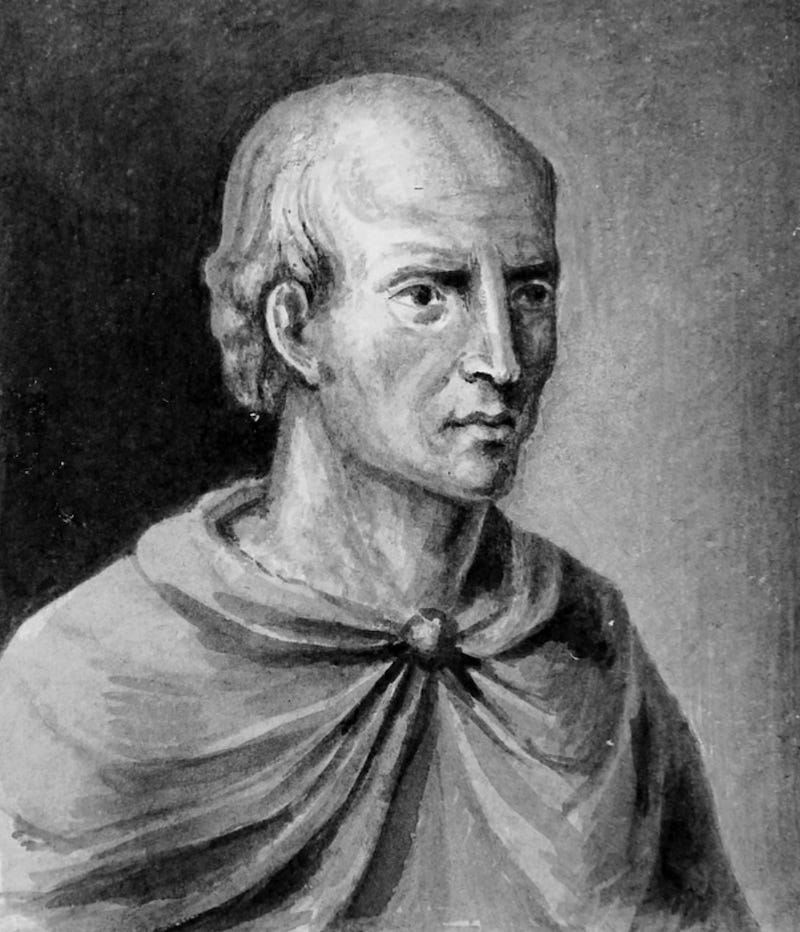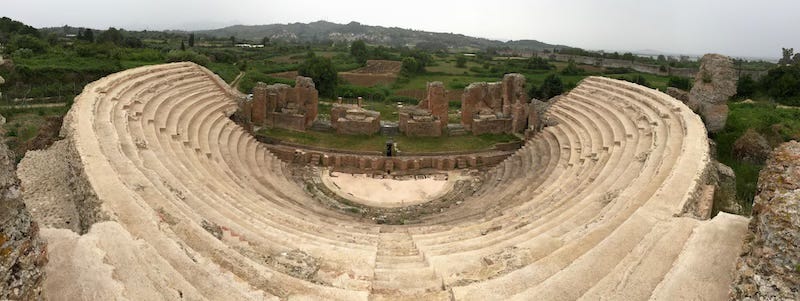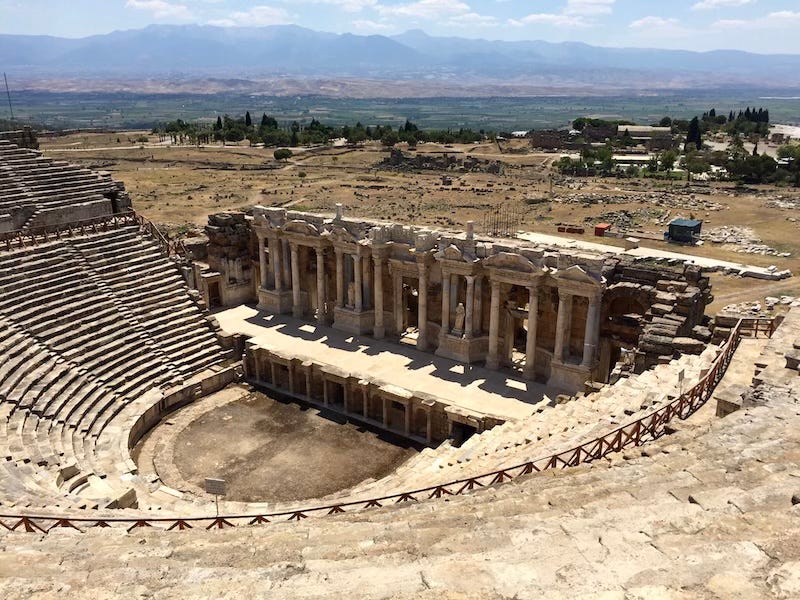Epictetus’s radical Stoicism—Part I
The sage from Hierapolis was more of an innovator than he is usually given credit for

There is no question that the Stoic philosopher Epictetus (50-135 CE) has been a major influence in my life. I first encountered him during a “Stoic Week” back in 2014. Specifically, this passage:
“If you are writing to a friend and are at a loss as to what to write, the art of grammar will tell you; yet whether or no you are to write to your friend at all, the art of grammar will not tell. The same holds true of the art of music with regard to melodies; but whether you are at this moment to sing and play on the lyre, or neither sing nor play, it will not tell. What art or faculty, then, will tell? That one which contemplates both itself and everything else. And what is this? The reasoning faculty.” (Discourses, I.1)
I thought, wow, who is this guy? Blunt, no-nonsense, getting straight to the point, cogent logic. I need to read more! And more I did read, all there is by Epictetus. Well, actually, by his student, Arrian of Nicomedia, who compiled and published his notes. The four volumes of the Discourses (those that survive out of the original eight); the Enchiridion, or Manual; and the available fragments.
Then I started writing about Epictetus and his philosophy. My first book on Stoicism, How to Be a Stoic: Using Ancient Philosophy to Live a Modern Life, is organized in three parts, each one corresponding to the three disciplines of Epictetus: desire and aversion, action, and assent (more on these in a moment). Then I co-authored with my friend Greg Lopez a unique collection of 52 Stoic “spiritual” exercises, entitled A Handbook for New Stoics: How to Thrive in a World Out of Your Control. You guessed it: it’s organized in three parts, one per Epictetean discipline. Finally, I published A Field Guide to a Happy Life: 53 Brief Lessons for Living, which is literally a rewriting of Epictetus’s Enchiridion, updated to the 21st century, as well as my personal homage to a guy long dead who so dramatically and profoundly altered my life for the better.
Unfortunately, we don’t know much about Epictetus’s life. Arrian did write a biography of his teacher, but its lost to the sands of time. We know that he was born in Hierapolis, in modern western Turkey, and that he was a slave. In fact, “Epictetus” is not his real (unknown) name, the word just means “acquired.” And acquired he was, by none other than Tiberius Claudius Epaphroditus, emperor Nero’s personal secretary and himself a freedman, that is, a former slave.
Epaphroditus may or may not have been the one responsible for Epictetus’s lifelong injury to a leg that made it lame for the rest of his life. According to Origen, Epaphroditus one day got angry and started twisting Epictetus’s leg. The latter endured the ordeal with composure, warning his master that the leg would break. When it finally did, his comment was simply: “There, did I not tell you that it would break?” (Contra Celsum, 7.53)
Still, Epaphroditus allowed Epictetus to study philosophy under the great Musonius Rufus. Eventually, Epictetus was freed, likely after Nero’s death in 68 CE (fun fact: the emperor, a known coward, asked Epaphroditus to kill him). In 93 CE Epictetus and other philosophers were kicked out of Italy by a later emperor, Domitian, who didn’t much appreciated people who frankly spoke truth to power. This, by the way, means that Epictetus, as well as Musonius, were part of the informal band often referred to as “the Stoic opposition.”
Epictetus moved to Nicopolis, in northwestern Greece, where he re-established his school. He became one of the most sought-after teachers of the young Roman nobility, eventually becoming friend with yet another emperor, Hadrian. While he lived simply and alone for most of his life, in old age Epictetus adopted the child of a friend, who would otherwise have been “exposed,” that is, left to die, and raised him with the aid of an unnamed woman who may or may not have become his wife. He died at age 85, more or less.

Now, why am I telling you all of this? Because Epictetus is often portrayed as a classical Stoic, whose philosophy went back to the third scholarch of the Stoa, Chrysippus of Soli. As distinct, I suppose, from the more divergent and eclectic kind of Stoicism taught by Panaetius and Posidonius, and possibly even Seneca.
(Interesting note: Epictetus and Seneca must have overlapped at Nero’s court, though Epictetus was a teenager at the time. He never mentions Seneca, possibly because of the latter’s involvement with the Nero regime, which was one of the targets of the Stoic opposition admired by Epictetus.)
By contrast, I’ve come to think that Epictetus was actually a pretty radical thinker within the Stoic tradition, and that his version of Stoicism was not only innovative for the time, but the best bet for a starting point from which to update the philosophy to the 21st century, one of my ongoing projects.
I think there are at least six areas in which Epictetus’s Stoicism differs in interesting and productive ways from what had been up to then a four-century old tradition: his focus on what he called the fundamental rule of life; the centrality of judgment, rather than virtue; a proposal for a new conception of role ethics; the articulation of the three disciplines; his notion of radical freedom; and his rejection of moral blame. Let’s take a quick look at each.
I. The fundamental rule
The Enchiridion famously begins:
“Some things are up to us, while others are not up to us. Up to us are conception, choice, desire, aversion, and, in a word, everything that is our own doing; not up to us are our body, our property, reputation, office, and, in a word, everything that is not our own doing.” (1)
This is nowadays often called the dichotomy of control, a term that, insofar as I can tell, was introduced by Bill Irvine in his influential A Guide to the Good Life: The Ancient Art of Stoic Joy. With all due respect to Bill, I think that was a mistake, because the word “control” engenders all sorts of misunderstandings. I prefer to stick to the terminology used by Epictetus himself and call it “the rule,” or the fundamental rule (of life).
Essentially, Epictetus is drawing a sharp distinction between things for which we are ultimately responsible (the buck stops with us) and things for which we are not (the buck stops with someone or something else). And it turns out that the only things that are truly up to us are our considered judgments, which lead us to endorse or reject certain values and consequently to act or not to act in certain ways. That’s it. Everything else we can influence—by way of our judgments and attempts to act—but at the end of the day depends on external factors.
To give you just one example: say that tomorrow I’m scheduled for a job interview. It comes natural to worry about the outcome, that is, whether or not I’ll get the job. But for Epictetus that’s exactly the wrong thing to do, because the final decision depends on factors that are not up to me, including the competition, the fit between my resume and the job description, the opinions of the person who is conducting the interview, and so on.
What, then, is up to me? Plenty: to do my best to put together a good resume; to study up for the interview; to try to get a good night’s sleep before the interview (whether I succeed at that is not up to me); to try to be on time for the interview (again, not to actually succeed in doing so); to focus on the interview itself while it is happening; and so forth.
Epictetus’s fundamental advice, then, is to remind ourselves of the rule in everything we do, concentrate our attention and efforts on what is up to us, and mentally prepare to accept whatever outcome with equanimity.
Now, one often hears that the fundamental rule predates Epictetus, but there is debate about this. It is certainly found in other, later, traditions, for instance in eight century Buddhism (the work of Shantideva) and eleventh century Judaism (Solomon ibn Gabirol). And of course in the 20th century Christian Serenity Prayer written by theologian Reinhold Niebuhr. But are there Stoic precedents?
I asked my friend and colleague John Sellars, author of Lessons in Stoicism: What Ancient Philosophers Teach Us About How to Live, and he was rather doubtful. Epictetus himself refers to his teacher, Musonius, in Fragment 4, which is the same as Musonius’s fragment 38. The concept is vaguely attested to both Chrysippus and Aristotle, though both use it differently from Epictetus (if you are interested, check pp. 940 and 942 of John’s paper, “Stoics against Stoics”). Cicero, in De Finibus 3.22, uses the analogy of an archer who is attempting to hit a target, which he credits to the Stoic philosopher Antipater of Tarsus (died 130/129 BCE). John pointed out to me, however, that while the archer cannot guarantee hitting the target, he has some control over the situation, and the distinction between what is and is not up to him is not nearly as sharp as in Epictetus.
Regardless, insofar as we know, nobody has made the fundamental rule such a crucial aspect of their philosophy, inside or outside of Stoicism, so I think we can credit Epictetus, if not with a complete innovation, certainly with grasping the importance of the concept and using it accordingly.
II. Judgment, not virtue
We are often told that Stoicism is founded in the practice of the four cardinal virtues: prudence, courage, justice, and temperance, though these are actually first introduced by Plato (in Republic, 4.426-435). But Epictetus rarely even mentions the word. He does so a few times, for instance when he says that “moral purpose becomes the only vice, or the only virtue” (Discourses 2.23), but that’s not his focus, very much unlike Cicero and Seneca, for instance.
Instead, Epictetus insists that the most precious thing we have, the summum bonum (highest good) is our prohairesis, that is, our faculty of judgment. This is a direct result of the fundamental rule: since the only thing that is truly up to us is our ability to judge situations, then it follows that prohairesis ought to be our only concern. Indeed, Epictetus says so explicitly:
“Make it, therefore, your study at the very outset to say to every harsh external impression, ‘You are an external impression and not at all what you appear to be.’ After that examine it and test it by these rules which you have, the first and most important of which is this: Whether the impression has to do with the things which are up to us, or with those which are not up to us; and, if it has to do with one of the things not up to us, have ready to hand the answer, ‘It is nothing to me.’” (Enchiridion, 1)
“It is nothing to me” doesn’t mean that we don’t care. It just means that we realize that that thing is not inside our sphere of agency and that therefore the only rational attitude about it is one of equanimous acceptance. Think back to my example of the job interview: I do care about getting the job, but in the Epictetean sense it is nothing to me, because it does not fall under the things that are my proper responsibility.
The direct connection between the fundamental rule and the notion that refining our judgment is the highest good hints at the fact that Epictetus’s system is highly integrated and internally coherent. In part II of this essay we will see that the very same logical interconnection links together the other four pieces of the puzzle: role ethics, the famous disciplines, the concept of radical freedom, and the rejection of moral blame.
One more observation for now. It seems to me that Epictetus’s emphasis on judgment, rather than virtue, as the highest good anticipates modern Stoic Larry Becker’s idea that virtue should be re-conceptualized as “ideal agency.” In his in-depth discussion of ideal agency as virtue, Larry writes:
“Wisdom in two senses is also included in the notion of ideal agency. Such agency is the practical ability to optimize the success of one’s endeavors, and means having wisdom in the narrow sense of practical intelligence (phronesis), along with the knowledge necessary for effective deliberation and choice. But the move from healthy to fit agency, and then to the limit of versatility for it [i.e., ‘virtuoso agency’], inevitably means that ideal agents will frame their deliberations in terms of what is best for their whole lives. That frame of reference, together with the enormous breadth and depth of knowledge required to make practical intelligence effective in it, surely qualifies as wisdom in a broad sense (sophia). … For an ideal agent, the appropriate exercise of healthy agency proper is her most comprehensive and controlling endeavor.” (A New Stoicism, chapter 6, section 2)
In Becker’s terminology, an ideal agent is a sage, and that’s the condition we should all strive toward. Such an agent will have both practical (phronesis) and theoretical (sophia) wisdom, meaning that they will both know what is good and evil and how to achieve one and stay away from the other. Note that both of these aspects of wisdom are rooted in our ability to arrive at proper judgments. Finally, Becker explicitly says that such an endeavor is “most comprehensive and controlling,” meaning that it applies to everything we do, throughout our life. Epictetus would have nodded in vigorous agreement.
[Next time: role ethics, the three disciplines, radical freedom, and the stupidity of moral blame.]





Good read! Epictetus is my favorite Stoic. I find his (student’s) writings to be the most philosophically powerful, and I like his blunt demeanor (he’s the one I usually go to when thinking about what a Stoic would say about a given situation - I picture him as a “tough love” kinda guy!). Seneca is very enjoyable too, but more, perhaps, informal? Epictetus’ actual character also strikes me as more Socratic/sage-like than Seneca.
I always found it funny that I enjoyed reading Discourses more than Marcus’ Meditations - I feel like that would be a very hot take to people. 😅
That’s an unusual analogy!